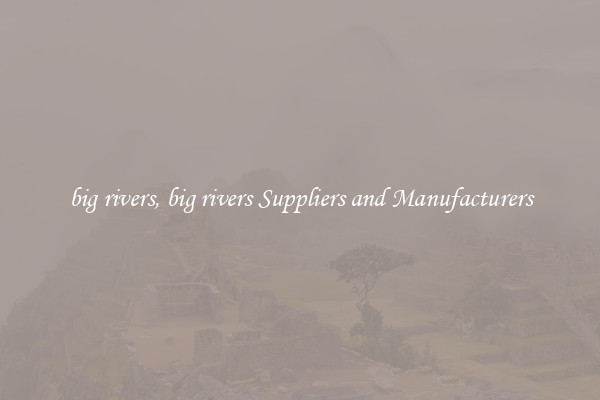big rivers, big rivers Suppliers and Manufacturers
Big rivers are essential water bodies that play a significant role in the ecosystem. They provide both environmental and economic benefits, making them valuable resources. One important aspect of big rivers is the presence of numerous suppliers and manufacturers that rely on their existence for various activities.

Suppliers and manufacturers that rely on big rivers often work in sectors such as agriculture, industry, transportation, and tourism. These sectors greatly benefit from the abundance of water provided by big rivers. For instance, in the agriculture sector, big rivers provide an extensive irrigation network, enabling farmers to cultivate vast tracts of land and enhance crop yields. This allows suppliers of agricultural inputs, such as fertilizers and equipment, to flourish.
The industrial sector also benefits from big rivers, as they provide a source of water for various manufacturing processes. Industries, such as paper mills, rely on big rivers to drive their operations, ensuring a steady supply of water for their production lines. Suppliers of machinery and equipment to these industries also thrive due to the demand for efficient water management systems.
In addition, big rivers play a crucial role in transportation. They act as essential waterways, enabling the movement of goods and people from one region to another. Suppliers and manufacturers involved in the shipbuilding industry, for example, rely on big rivers to provide a platform for constructing vessels. They also supply navigation equipment, parts, and accessories to enhance the efficiency and safety of river transportation.
Furthermore, big rivers have significant potential for tourism and recreation, attracting suppliers and manufacturers in this industry. Tour operators, hoteliers, and suppliers of various tourist services establish their businesses along the banks of big rivers. These companies offer river cruises, fishing expeditions, and other water-based activities, providing opportunities for adventure and relaxation to tourists.
However, it is essential to ensure sustainable practices in utilizing big rivers. Overuse or mismanagement of these resources can lead to environmental degradation and disrupt the delicate balance of the ecosystem. Suppliers and manufacturers must adopt responsible practices, such as implementing efficient water management systems and promoting eco-friendly products. Collaborating with conservation organizations can also contribute to the preservation of big rivers.
In conclusion, big rivers are invaluable resources that support various sectors like agriculture, industry, transportation, and tourism. Suppliers and manufacturers in these sectors heavily rely on big rivers for water resources and transportation networks. However, it is crucial to prioritize sustainable practices to preserve these essential water bodies for future generations.

View details

View details

View details

View details








